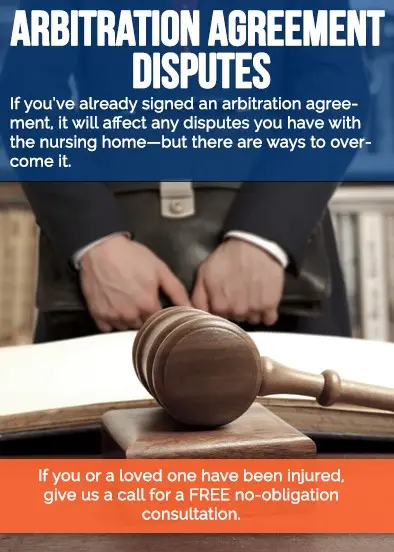
When someone signs up as a resident at a Georgia nursing home, they may be asked to sign an arbitration agreement. The most reputable nursing homes do not do this, but it’s becoming increasingly common. An arbitration agreement is a document that says you will not take the nursing home to court.
Instead, if any disagreement arises, you agree to settle it through arbitration. Arbitration is a private process where one person, or a panel of people, settles the disagreement.
Signing an arbitration agreement can take away your right to:
- File charges if the nursing home breaks state or federal law
- Bring the case before a trial by jury
- File malpractice charges
- Hold the nursing home accountable for negligence or abuse in a court of law
You do not have to sign an arbitration agreement. Signing the agreement cannot be made a condition of residency under Georgia law. That means that if you object to signing it, the nursing home still has to admit you or your loved one.
However, if a nursing home asks for this kind of agreement, you should just leave. You should seek out another nursing home and work only with reputable care facilities.
If you’ve already signed an arbitration agreement, it will affect any disputes you have with the nursing home—but there are ways to overcome it. Your first step should be to speak to a Georgia elder care lawyer and find out your legal options.
The attorneys of John Foy & Associates are experienced with nursing home cases and are here to help. Facing a dispute over an arbitration agreement can be daunting, but an experienced Atlanta nursing home abuse attorney can help protect your rights and navigate through the legal complexities. Call us at 404-400-4000 and get a free consultation today.
What Are the Problems With an Arbitration Agreement?
Arbitration agreements are inherently unfair. They ask you to sign away a long list of legal rights and protections. Nursing homes have been very open about why they do this: purely to reduce the number of lawsuits against them and the costs of malpractice or negligence claims. In other words, if they harm your loved one, they don’t want to pay for it.
Arbitration itself is not an unfair process. It’s often used in the corporate world to settle disputes in a low-cost, discreet manner. However, when it comes to protecting the rights of an individual or family against a large care facility, arbitration doesn’t measure up. Problems with arbitration include:
- The arbitrator is chosen by the nursing home. The arbitration agreement usually names a company or organization that will provide the arbitration. This is almost always an organization friendly to nursing homes, or even one that exists explicitly to protect nursing home interests. These organizations are unlikely to choose an impartial person to decide your dispute.
- The settlements are much smaller. You can end up recovering financial costs in both arbitration and a traditional lawsuit. This financial recovery is crucial because it can help you pay for medical bills and additional care. However, the amount you will receive tends to be smaller with arbitration. Often, it won’t be enough to cover the cost of the care you need.
- Not transparent. Cases that go through the courts are subject to what’s known as “discovery.” This is where both parties are required to turn over documents and records to the other side. Arbitration does not require an open discovery process and you may never get the documents you need.
- No appeal. Arbitration is a binding process. Whatever the arbitration panel decides is final. Some arbitration systems may have their own internal review system, but there is no way to appeal to a higher court. If an arbitrator decides against you, you’re stuck with it.
Get the strong arm
How Can You Fight an Arbitration Agreement?
Even if you already signed an arbitration agreement, you may be able to overturn it. Many individuals challenge the arbitration agreement on the grounds that they were told to sign it in a moment of great stress and need—often without knowing what it was. For example, if you were coming to the nursing home directly from the hospital and needed a care facility immediately.
Similarly, many nursing homes bury the arbitration agreement deep in paperwork that is otherwise about health care, privacy, and consent. This is misleading. Challenging an arbitration agreement on these grounds can work, but it’s difficult. You should have an experienced attorney handling your case.
Depending on who signed the agreement, you could have a much stronger challenge. Often it’s a relative who signs the agreement, not the nursing home residents themselves. This relative typically has the legal authority to make only medical decisions for their loved one—and an arbitration agreement is not a medical decision. In this case, the agreement may not be enforceable.
What If My Loved One Didn’t Know What They Were Signing?
If your loved one signed an arbitration agreement while they were experiencing dementia, disorientation, or the effects of medication, you have grounds to challenge the agreement. However, you need a knowledgeable lawyer on your side.
The nursing home will make the case that the agreement is still binding, and in some cases, they will prevail. In one Florida case, an arbitration agreement was enforced even though the elderly person who signed it was blind.
John Foy & Associates is committed to upholding the dignity and rights of the elderly, and our Atlanta personal injury attorneys possess the comprehensive knowledge needed for cases involving arbitration agreement disputes in nursing homes.
Can I Still Win a Recovery If I Signed an Arbitration Agreement?
Yes. If you signed an arbitration agreement, you have two options:
- Ask your lawyer to file suit anyway, as if no arbitration agreement existed. The nursing home will challenge the suit on the basis of the arbitration agreement, and your lawyer can then fight to have that agreement thrown out.
- Have your lawyer represent you in arbitration. At John Foy & Associates, we’ve had very good success with winning a recovery for our clients even if they were locked into arbitration.
In many cases, you can try both approaches—go to the courts first and take your case to arbitration if you have to.
The laws around elder care and arbitration are complex, but if your loved one was harmed, you deserve justice. Call John Foy & Associates and find out how we can help your case.
We offer a FREE consultation and we charge nothing unless we get you a financial recovery. Call 404-400-4000 and get your free consultation today.
404-400-4000 or complete a Free Case Evaluation form






